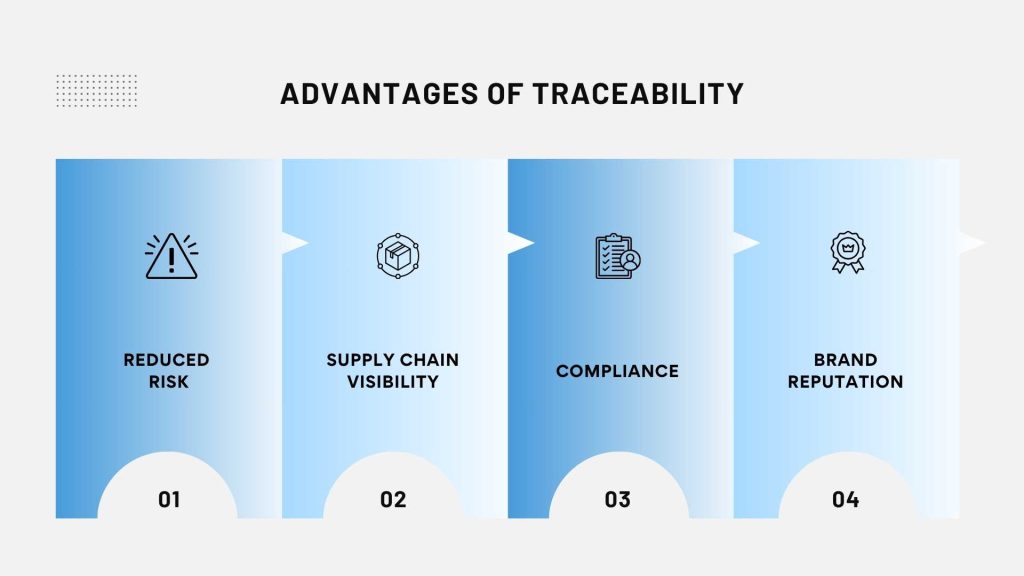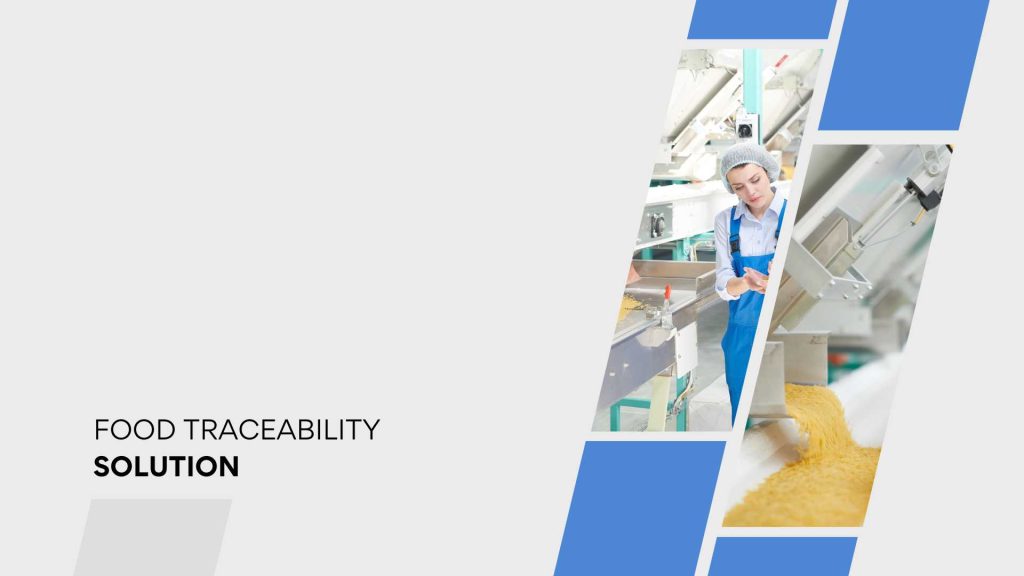Food traceability is a critical linchpin in today’s complex and interconnected global food system, weaving a web of transparency and accountability across every production, distribution, and consumption stage. The meticulous process enables tracking and tracing food products from their point of origin through various pathways, capturing essential details of their journey.
With a fusion of technology, stringent record-keeping, and precise labeling, food traceability serves as a sentinel, safeguarding food safety, ensuring quality, and nurturing trust between producers and consumers. This system not only acts as a guardian of public health by swiftly responding to potential risks but also champions sustainability and efficiency within the intricate tapestry of the food supply chain.
The market demand for food traceability will reach $22,275.1 million by 2025. The food manufacturing industry has been trying to track food from its farm or sea source to the point of maximum purchase for at least ten years.
The key components of food traceability include:
- Traceability Systems: These are technologies and procedures for tracking food products, including barcodes, RFID (Radio-Frequency Identification), QR codes, and databases.
- Record-Keeping: Detailed records are maintained at each stage of production and distribution, documenting information such as origin, processing methods, dates, locations, and other relevant data.
- Identification and Labeling: Each product is uniquely identified and labeled with information that allows its traceability, such as batch or lot numbers, expiration dates, and origin.
- Transparency: Information about the food’s journey is made available to relevant stakeholders, such as producers, distributors, regulators, and consumers, to ensure transparency and accountability.
Food traceability is crucial for several reasons:
- Safety: It helps quickly identify and contain foodborne illnesses or contamination outbreaks, enabling prompt recalls to protect public health.
- Quality Control: Traceability allows for monitoring the quality and authenticity of food products, ensuring compliance with standards and regulations.
- Supply Chain Management: It enhances efficiency in supply chain logistics, reducing waste, improving inventory management, and facilitating recalls if necessary.
- Consumer Confidence: Providing consumers with information about the origin and handling of food products fosters trust and confidence in the food they consume.

Why Are Food Traceability Systems Important?
Food traceability systems play a pivotal role in the modern food industry for several reasons:
- Food Safety: They enable quick identification and containment of foodborne illnesses or contamination outbreaks. In case of an issue, the system helps swiftly trace the affected products, minimizing health risks and protecting public safety.
- Quality Assurance: Traceability systems allow for monitoring the quality and authenticity of food products. This ensures compliance with standards and regulations, maintaining consistency and reliability for consumers.
- Supply Chain Management: They enhance efficiency in supply chain logistics. By providing detailed information about the movement of products. These systems aid in inventory management, reduce waste, and facilitate targeted recalls if necessary.
- Consumer Confidence: Offering transparency about a product’s journey from farm to table fosters consumer trust and confidence. When consumers can access information about a product’s origin, handling, and attributes, they can make informed choices, enhancing their satisfaction and trust in the brand or product.
- Regulatory Compliance: Traceability systems assist in meeting regulatory requirements and standards set by various governing bodies. They ensure that food producers and distributors comply with legal obligations regarding food safety, labeling, and documentation.
- Sustainability and Ethics: These systems contribute to sustainable practices by tracking the environmental impact of food production and transportation. They also aid in promoting ethical sourcing practices by providing visibility into the origins of ingredients or materials used in food production.
US Food and Drug Administration Regulation
The US Food and Drug Administration (FDA) controls and manages many products, ensuring their safety, efficacy, and quality for public health. Within the food sector, the FDA sets and enforces standards to guarantee the safety of domestically produced and imported food products.
The FDA monitors food labeling, ingredients, additives, and packaging through stringent regulations to uphold transparency and accuracy in consumer information. Their oversight spans from farms to processing facilities, distribution networks, and retail outlets, ensuring compliance with established standards and protocols.
The FDA plays a pivotal role in safeguarding the nation’s food supply, continually adapting to technological advancements and emerging challenges to maintain high standards of safety and quality in the food industry.
Challenges and Opportunities with Food Traceability System
Certainly, food traceability systems come with both challenges and opportunities:
Challenges:
- Complex Supply Chains: Modern food chains are intricate and global, making tracking every product component challenging. Traceability becomes difficult when dealing with numerous intermediaries, especially in international trade.
- Data Standardization: Harmonizing data formats and standards across various stakeholders is a significant challenge. Diverse systems and technologies used by different parties can hinder seamless data exchange and interoperability.
- Cost and Implementation: Implementing comprehensive traceability systems requires significant technological, training, and infrastructure investments. Especially for smaller producers or businesses, the initial cost can be prohibitive.
- Consumer Engagement: Despite the availability of traceability information, engaging consumers to utilize and understand this data can take time and effort. Consumers might need to actively seek or fully understand the significance of traceability information provided to them.
- Cybersecurity and Privacy Concerns: As traceability systems rely on digital technologies and data sharing, they are susceptible to cybersecurity threats. Ensuring data security and protecting sensitive information while maintaining transparency is a delicate balance.
Opportunities:
- Improved Food Safety: Enhanced traceability enables rapid response to food safety issues. It allows for quicker identification and isolation of contaminated products, reducing the scope and impact of recalls.
- Supply Chain Efficiency: Traceability systems streamline supply chain operations, improving inventory management, reducing waste, and optimizing logistics. They enable more precise tracking of products, leading to better resource allocation.
- Consumer Trust and Transparency: Giving consumers access to detailed information about the food they consume builds trust and loyalty. Traceability offers transparency, allowing consumers to make better-informed decisions based on their preferences and values.
- Market Access and Differentiation: Meeting traceability standards can be a competitive advantage. It can open doors to new markets, prioritizing transparency and quality assurance enabling businesses to differentiate their products.
- Innovation and Collaboration: The advancement of technology opens avenues for innovation in traceability systems. Collaborative efforts between stakeholders and technological advances like blockchain or IoT (Internet of Things) can revolutionize traceability, making it more efficient and accessible.
Conclusion
Acumatica ERP stands as a transformative solution poised to revolutionize food traceability management. Its integrated suite of tools and functionalities offers a comprehensive platform to address the intricate challenges within the food supply chain.
With real-time visibility across all production, distribution, and consumption stages, Acumatica enables seamless traceability, empowering businesses to track and monitor products with precision. Through its robust data management capabilities, Acumatica facilitates standardized record-keeping and data exchange among stakeholders, ensuring compliance with regulatory standards.
Moreover, its adaptable nature allows for scalability, accommodating the complexities of diverse supply chains while promoting transparency and trust among consumers. Acumatica ERP emerges not just as a technological solution but as a catalyst for elevating food traceability management setting new standards in safety, quality assurance, and efficiency within the dynamic landscape of the food industry.

Sangeetha brings 20 years of experience in Information Technology which includes Solution architecting, building micro services, research, and evaluation of business applications, integrating apps.

